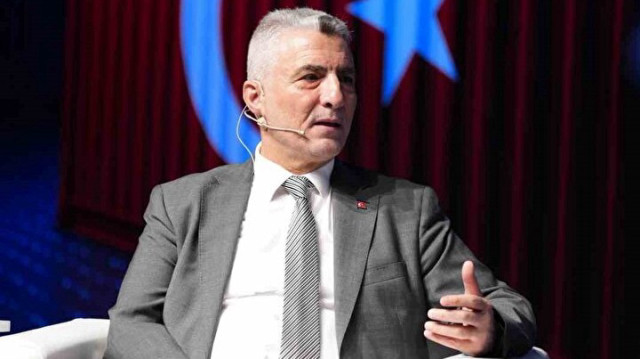
Bolat strongly condemned Israel’s aggression toward Iran, calling the airstrikes “completely unacceptable and deplorable.” He acknowledged Iran’s military response and the eventual ceasefire reached after 12 days of hostilities.
At the "Century of Türkiye in Trade Summit" organized by Albayrak Media with support from the Ministry of Trade, Turkish Trade Minister Ömer Bolat emphasized the strategic importance of regional stability for Türkiye’s economy and trade, particularly in light of the recent Iran-Israel conflict.
Speaking at the summit, which was attended by Istanbul Governor Davut Gül, Anadolu Agency Editor-in-Chief Yusuf Özhan, Turkish Exporters Assembly (TİM) Chair Mustafa Gültepe, and business leaders from DEIK, ASKON, and Albayrak Group, Bolat said, “Iran lies at the heart of the Middle Corridor and the route to Central Asia and Turkic republics. From a logistics standpoint, this makes the region highly sensitive. That’s why we welcome the ceasefire.”
Bolat strongly condemned Israel’s aggression toward Iran, calling the airstrikes “completely unacceptable and deplorable.” He acknowledged Iran’s military response and the eventual ceasefire reached after 12 days of hostilities. “The U.S. administration also played a role in brokering the truce,” he added. “As Türkiye, we are pleased. Iran is our neighbor, and regional peace matters greatly to us—not only politically but also economically.”
He noted that the escalation had serious economic ripple effects: “Once the bombing started on June 13, energy markets reacted immediately. Oil and natural gas prices surged, along with commodities like gold—up by as much as 15 to 20 percent. Any instability in the Strait of Hormuz and the Persian Gulf—through which 25% of the world’s oil flows—disrupts global energy security and impacts people and economies alike.”
The Energy and Trade Equation
Bolat highlighted that energy is Türkiye’s largest import category, citing how the Russia-Ukraine war in 2022 caused Türkiye’s energy bill to spike to $97 billion. “We brought that down to $65 billion last year thanks to lower global prices and increased domestic production, like the Sakarya gas field and Gabar oil discoveries,” he said.
He also stressed that Türkiye receives a significant number of tourists from Iran—3.3 million in 2024, with over 1 million visiting in just the first five months of 2025. “Tourism is another area where instability can cause setbacks,” he noted.
Bilateral trade between Türkiye and Iran stands at $7.8 billion, with Türkiye exporting $3.25 billion worth of goods and importing $4.55 billion, mainly in natural gas. While there were no supply disruptions, Bolat acknowledged that war naturally poses a risk to trade flows. “That’s why we’re relieved a ceasefire was achieved relatively quickly.”
A Strategic Route Under Threat
“Iran sits squarely on the road to Central Asia and Turkic republics. It’s a key transit hub,” Bolat emphasized. “Conflict there threatens the entire Middle Corridor. If the ceasefire holds, hopefully the negative impacts will be limited.”
He compared current global instability to Türkiye’s relatively peaceful trajectory over the past two decades. “In the north, 2 million people have died in the Russia-Ukraine war over 3.5 years. In the west, the Balkans saw renewed tensions. In the south, the Syrian civil war has lasted 13 years, and Israel’s brutal assault on Gaza has continued for over 19 months,” he said. “In this volatile region, Türkiye has maintained stability over 780,000 square kilometers, growing its economy from $238 billion to $1.37 trillion.”
He added that per capita income has risen from $3,600 to nearly $16,000 by the first quarter of 2025.
Türkiye in the Global Trade Arena
Bolat concluded by noting that Türkiye is now classified as an upper-middle-income country by the World Bank, calling it a significant milestone.
He also warned of new challenges on the horizon: “The world is entering a period of trade wars. With Donald Trump back in the White House, the U.S. is targeting countries with which it has large trade deficits—$1.3 trillion—by raising tariff barriers. Türkiye, with relatively low 10% average tariffs, appears to benefit initially compared to others like China, the EU, Japan, and Canada.”
However, Bolat cautioned that this could mean more competitive pressure on Türkiye as global exporters unable to access the U.S. market shift focus to Europe, Asia, and the Middle East through Türkiye.
“This will make our export environment tougher. We need to be ready,” he said.
Hello, the comments you share on our site are a valuable resource for other users. Please respect other users and different opinions. Do not use rude, offensive, derogatory, or discriminatory language.
The floor is all yours.








